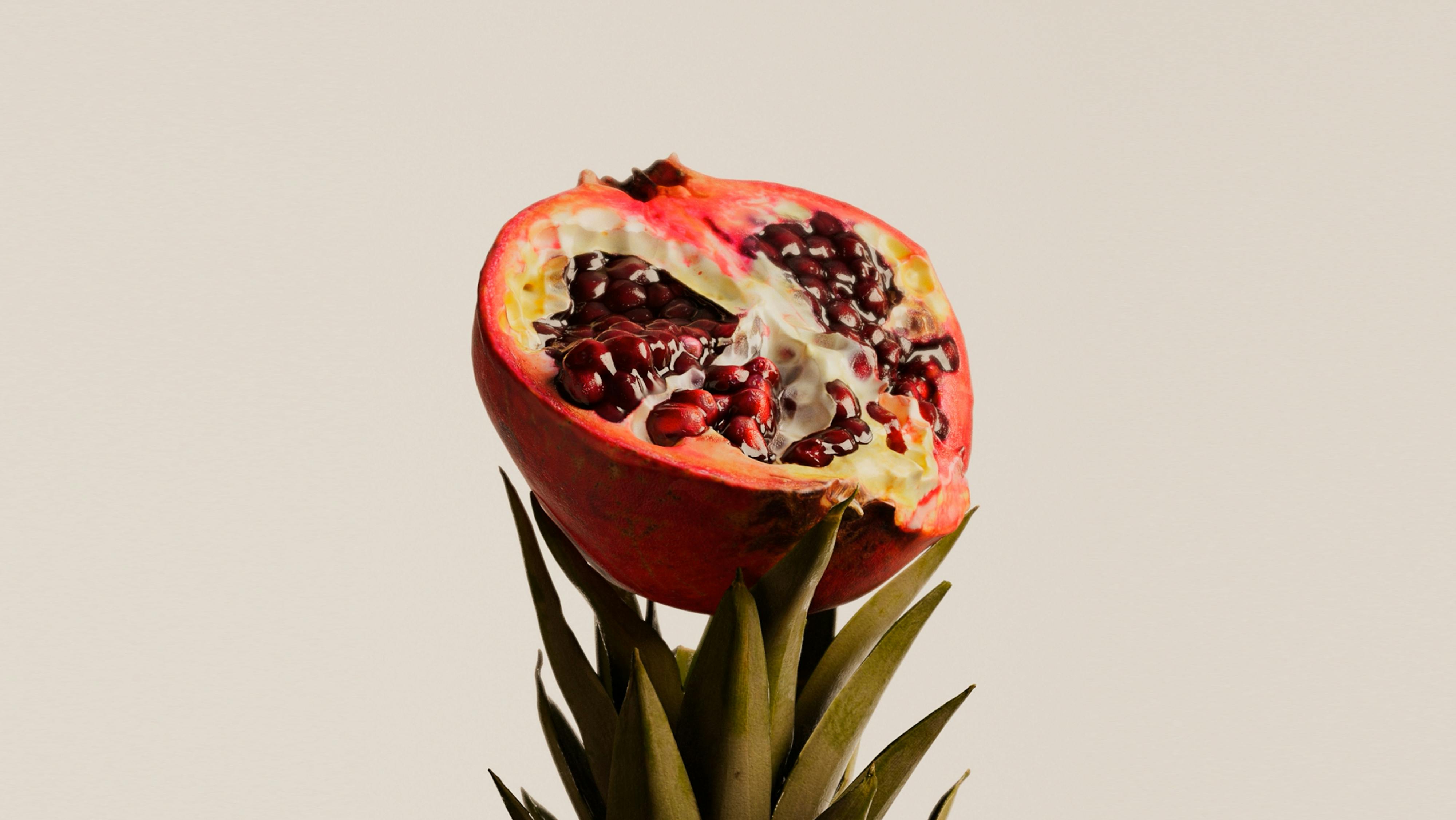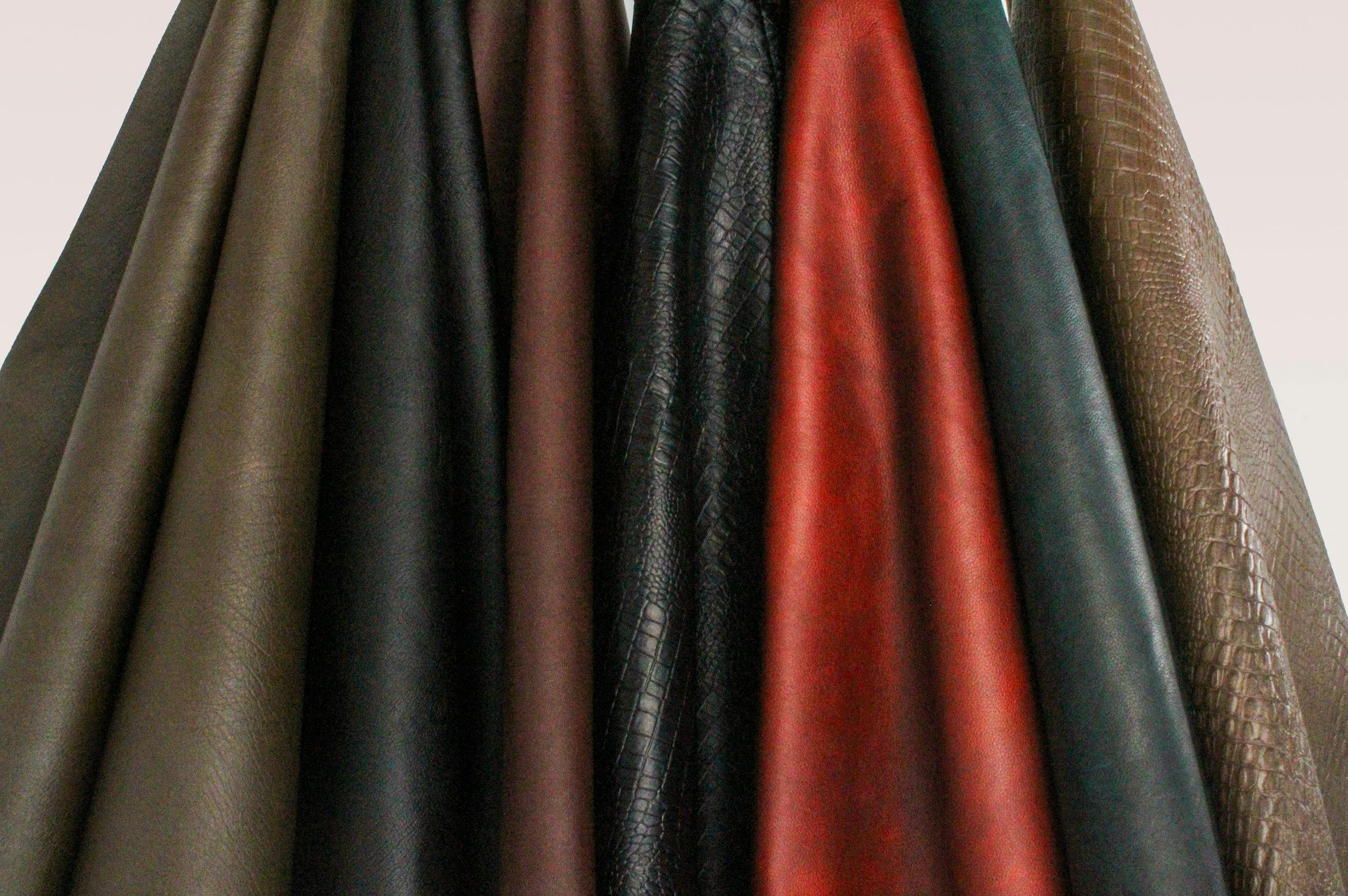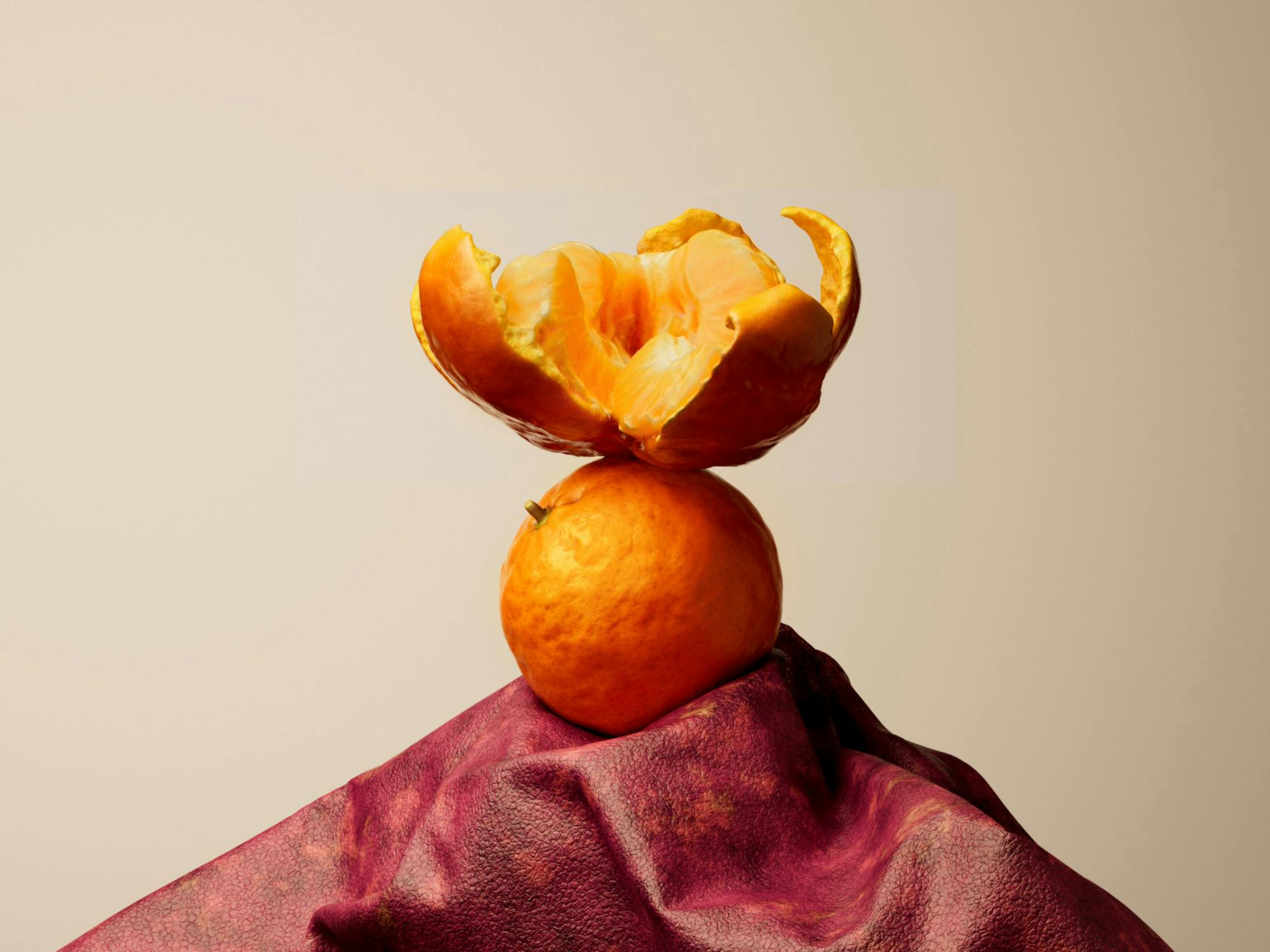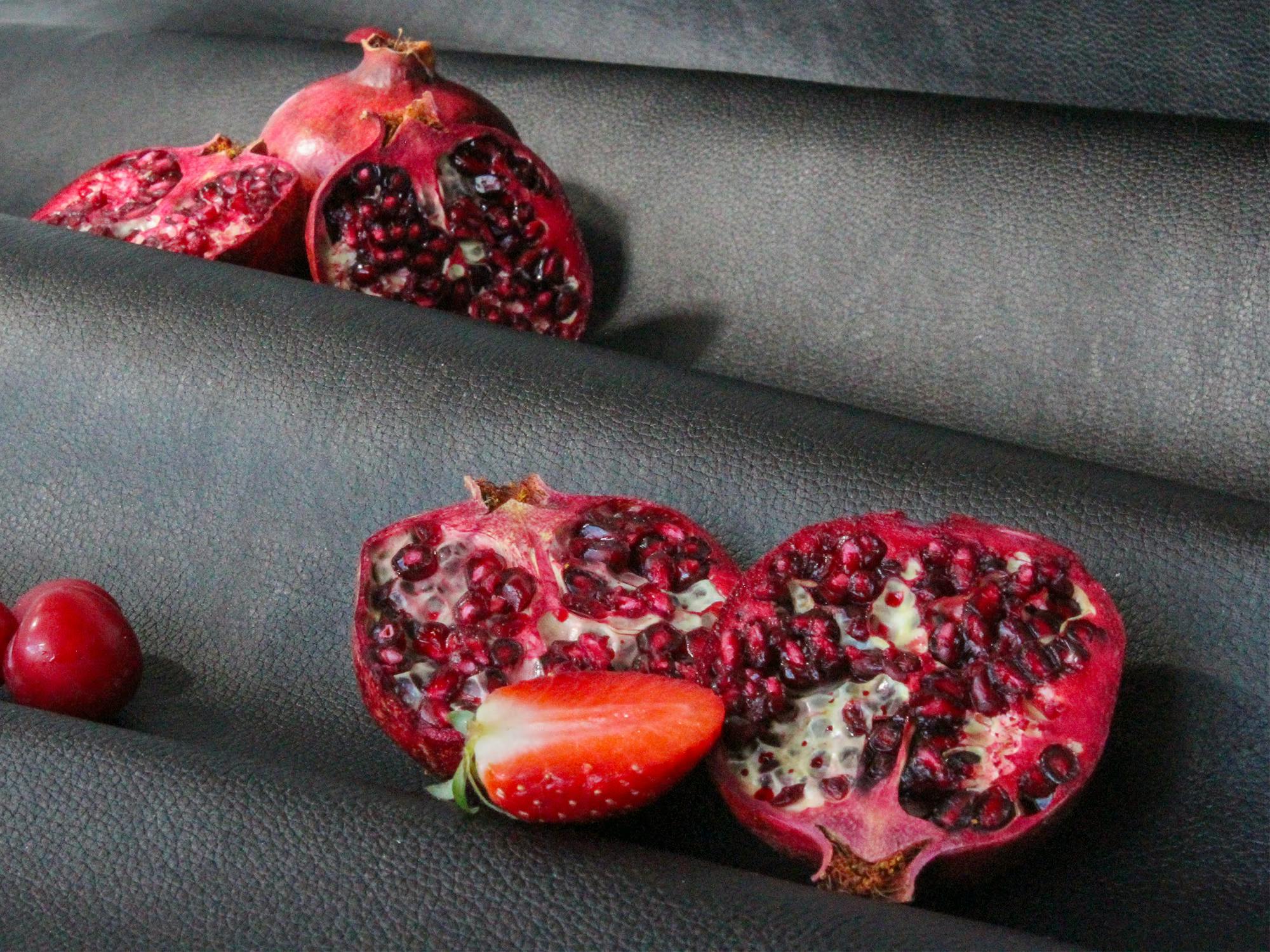Revolutionary biomaterials
for forward thinkers.

Performance
meets possibility.

Using cutting-edge technology modeled on nature’s own design, Polybion™ grows premium, high-performance biomaterials from fruit waste.

From linear to circular
From leftover to constructive
From old ways to Celium™
We believe biology is the best tool to face our global challenges. We use locally produced agro-industrial fruit waste as raw material to craft forward-thinking biomaterials such as Celium™- Premium Cultivated Cellulose. By manufacturing with the building blocks of life and circularizing supply chains, we produce a superior material while prioritizing our planet.
Natural systems are cyclical; waste becomes nutrients that initiate new growth. By learning from nature, Polybion™ developed a production model that is not linear but a loop, simultaneously alleviating three major environmental problems: livestock, food waste, and plastic. This represents a paradigm shift from centuries of resource-mining practices to the regenerative cultivation of resources. Polybion™ is proud to be leading this charge.
Founded by brothers Axel and Alexis Gómez Ortigoza with Bárbara González Rolón, PhD, Polybion™ is a diverse group of biotechnologists, chemists, biologists, engineers, financiers, creatives, designers, and political scientists. We take inspiration from natural processes and organisms, and we share a common dream to create a better world.

Impact requires scale
Bio innovations and sustainable solutions face a common challenge: scalability.
By 2030, as the consumer class reaches nearly 5 billion, affordability and accessibility become crucial for next-gen materials like Celium™ - Premium Cultivated Cellulose.
In 2022, we reached a pivotal milestone by launching FOAK I, the first-ever bacterial cellulose production facility. Spanning 14,000 sq. ft., it's designed to produce 1.1 million sq. ft. of Celium™ annually.
Our scaling strategy is built on three pillars: volume, consistent quality, and competitive pricing. Unlike other biomaterials, our process uses minimal infrastructure and fruit waste, leveraging existing large-scale fermentation equipment. This not only makes scaling up more feasible but also ensures our technology can be easily adopted worldwide.
During 2024, we're focusing on automating our processes to enhance efficiency, quality, and reduce cycle times.
Where biology meets creativity, the future unfolds.


Celium™
Cel (derived from the word cellulose, the most abundant organic polymer on Earth) + ium (the Latin suffix used in chemical elements)
Celium™- Premium Cultivated Cellulose, is grown by feeding bacteria with agroindustrial fruit waste. A versatile textile with endless design possibilities, it can be customized by color, graining, embossing, and water resistance—all while preserving its exceptional strength.
Celium™ is vegan and organic, and we control the thickness through its growth, making it easy to tailor. Due to its biological nature, each piece of Celium™ is unique and distinct as a fingerprint, lending it the hallmark of luxury.
Nature chose cellulose to structure many of its most precious creations. We’ve captured that wisdom in Celium™.

Technology
We industrialized cellular agriculture to biofabricate Celium™. Combining material science with bioengineering, our technology is scalable, modular, and high yielding.
In cellular agriculture, cells from fungi, bacteria, or mammals consume nutrients in a sterile environment that promotes growth. We grow Celium™ by feeding bacteria with agro-industrial fruit waste. But first, we set up the perfect environment for the cells to self-organize and they create the cellulose structure as a metabolic by-product. Once formed, Celium’s cell-based membrane undergoes a sustainable stabilization process to achieve its high-performance characteristics.
Our production model is EPA, REACH, and ZDHC compliant and concentrated within a 30-mile radius, dramatically reducing our carbon footprint. There is currently enough of the fruit waste we use to produce 168,000,000 square feet of Celium™ annually (and we have identified three other types of local fruit waste equally abundant). With zero hazardous chemicals released in any part of the process, nor significant biomass outputs between growth cycles, Celium™ is as circular as it gets.
Piedras Pintas: Our Genetic R&D Lab Enters a New Era

- Published on
- April 8, 2025
Inside Polybion’s upgraded innovation hub in Ensenada, Baja California, Mexico
Innovation doesn’t begin at the moment of recognition. It begins far earlier- when no one is watching.
While FOAK, our bio-manufacturing facility, brings scale to life, Piedras Pintas BioFoundry is where direction is forged. Located in Ensenada, Mexico, this genetic R&D lab has always been the engine behind our deepest scientific advancements. Now, with a purpose-built, and recently inaugurated space, it enters a new era.
What began 4 years ago in a repurposed space—humble, makeshift, and filled with imagination—has evolved into a fully equipped laboratory designed for BSL-2 genetic engineering and biofabrication. This upgrade marks a pivotal moment in our journey: a strategic investment in the kind of innovation that doesn’t make headlines, but makes everything else possible.
“This lab didn’t just change our workflow, it changed our pace of discovery. Precision became easier. The rhythm picked up. What used to take months, we now do in weeks.” says José Manuel Aguilar, Polybion’s Chief Scientific Officer.
A Different Kind of Growth
While our fashion collaborations and Celium™’s appearances on global stages draw public attention, Piedras Pintas BioFoundry is the core of our scientific evolution. It’s where we run deep experimentation—exploring the biological potential of our strains and designing new behaviors, metabolic pathways, and material possibilities from within.
This isn’t science for spectacle. It’s science that scales. From enhancing growth rates and productivity to modifying internal structures, the work done in Piedras Pintas is steadily reshaping how Celium™ can perform and what it can become.
Some of the research happening here includes:
• Enhancing bacterial metabolism to grow cellulose faster and denser, which will serve as a platform for future strain developments, a new and improved chassis upon which to further develop strains
• Exploring CRISPR-Cas9 tools to edit the genome of our strains to produce bio fabricated colors from within
• Creating the standard operating procedures for vital processes like genetic construction, recombination and transformation of bacterial-cellulose-producing strains
“Our job is to give bacteria the instructions they need to build smarter,” says José Manuel AKA “Chema”. “We’re not just increasing outputs—we’re evolving the process.”
From Precision to Impact
At Piedras Pintas, failure is part of the method. One early miscalculation—underestimating how slowly a chosen strain grew—forced the team to redesign their entire workflow. The lesson wasn’t about choosing the “right” organism; it was about building processes that adapt, improve, and iterate with resilience.
And that’s part of what makes this lab unique: it blends the methodological discipline of academia with the agility of industry. Weekly whole-team meetings, dynamic decision-making, and rapid prototyping allow the team to move at three times the speed of traditional academic labs. One must never underestimate the power of small teams with strong will.
“Some labs have the funding but don’t move. Others move fast but lack direction,” says Chema. “At Piedras Pintas, we move with intention.”
A Strategic Engine
Piedras Pintas BioFoundry has always played a foundational role in our innovation pipeline, and will be even more important for the next 10 years. Every discovery here informs production at FOAK I and vice versa, an orchestrated cooperation that shrinks iteration times and boosts success rate. Every experiment is a step toward materials that are not just grown, but grown with purpose: already colored, already structured, already tuned to perform.
In this way, the lab represents more than the future of Celium™, it reflects our commitment to a deeper kind of innovation. One that doesn’t just respond to market demands, but reshapes them.
The scientific work done in Ensenada might not always be visible. It rarely appears in a campaign or a press release. But it is the reason we can promise performance, originality, and continuous evolution.
Because at Polybion, we believe that the most meaningful transformations happen in silence, in well-lit labs, under microscopes, inside petri dishes. That’s where our next generation of innovation begins.
What 's Next?